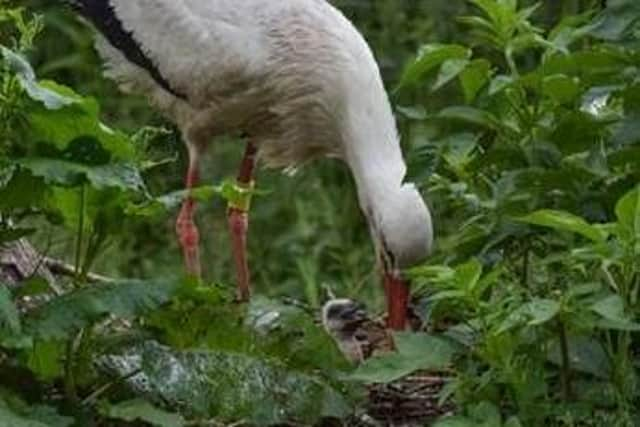It's a first for WWT Martin Mere Wetland Centre in Lancashire as two Stork chicks born for first time


The chicks hatched at the end of May and can be seen sitting underneath mum to the right of the stork lodge in the Eco-garden.
Centre Manager, Nick Brooks, said: “The white storks are a popular attraction at Martin Mere, with twelve birds (6 female and 6 male), they are often heard before they seen as they don’t have any muscles in their voice box.
Advertisement
Hide AdAdvertisement
Hide Ad"They have developed the ability to clack their bills really loudly, using a throat pouch to amplify the sound, at mating time. This is the first time we have successfully hatched out chicks with these birds and our visitors already love seeing them.”
The birds arrived at Martin Mere in 2020 after being originally brought over from Poland who have a scheme to re-home storks that have become injured and unable to continue with migrations. There is a white stork reintroduction programme in Poland to release chicks throughout Europe.
Storks build a large nest out of sticks and grass, laying three to five eggs. The parents take turns to sit on them for about thirty days until they hatch. When the young hatch, they stay in the nest for a period of time.
Storks are carnivores, eating any small animals they can find. They survive well in wetland areas where their diet includes fish, amphibians, crustaceans, molluscs, small birds and mammals etc. In drier areas their diet will contain more lizards and insects, such as grasshoppers and locusts, a nutritious protein source.
Advertisement
Hide AdAdvertisement
Hide AdMartin Mere is a mere near Burscough, in Lancashire situated on the West Lancashire Coastal Plain.
The mere is a vast marsh, around grid reference SD 41 15 that was, until it was drained, the largest body of fresh water in England.
Farms and market gardens were established on the rich soils of the reclaimed land. Between 1974 and 1982 sand from the former lake bed was quarried for use in glass-making at Mere Sands Wood which is now a nature reserve.
The BBC television programme Autumnwatch was broadcast live from Martin Mere in 2006 and 2007.